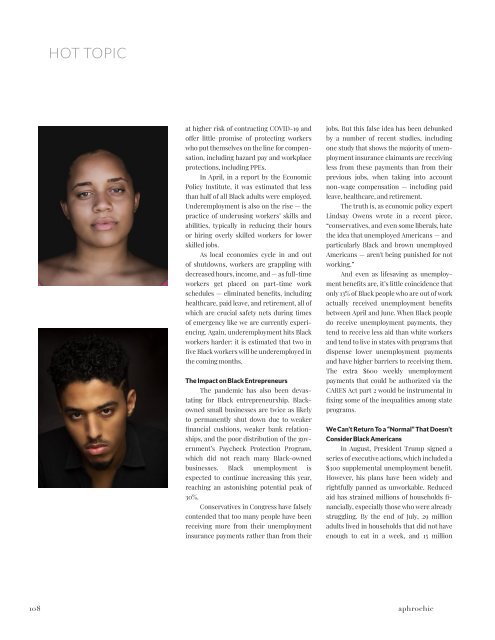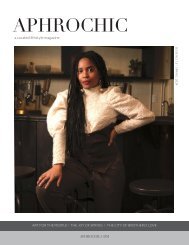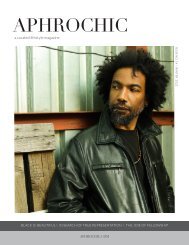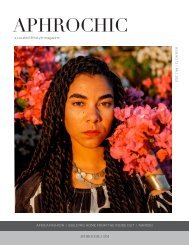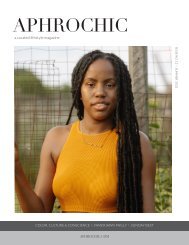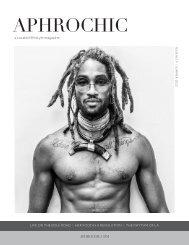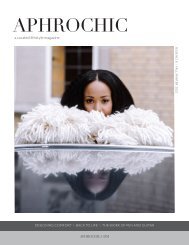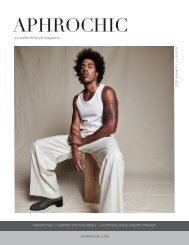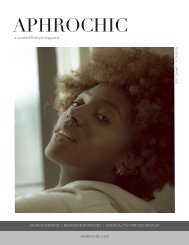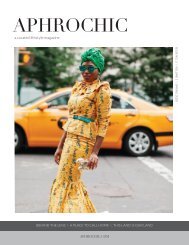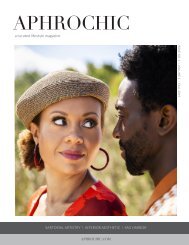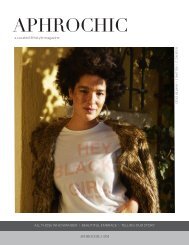AphroChic Magazine: Issue No. 5
This issue celebrates the things about Black culture that are enduring, and that can’t be altered by one bad year - our resilience, our creativity and our radical joy. In the pages of this issue we’ll be sharing with you the visionary work that is taking place every day in our Diaspora. We’ll introduce you to a growing community of Black home brewers who are creating their own space in craft brewing. Then we’re off for a photo tour of beautiful Tanzania. We’ll look at the modern work of South African artists Faatimah Mohamed-Luke and Al Luke, and for the holidays, we’ll share with you our modern take on the Pan-Africanist celebration of Kwanzaa. In issue 5 we are thrilled to take you to the hottest decor boutique in Germany, created and designed by our cover star Chris Glass. Then we’ll give you a sneak peek into our latest project - AphroFarmhouse. And our hot topic is an important discussion on the recession and how we can craft an economic plan that puts Black people first. While we are excited to show you all that’s beautiful around the Diaspora, we also want to share with you the reason why we do this work - to educate, uplift and give back. This holiday season we’re excited to let you know about our partnership with (RED) on an exclusive collection of pillows and tabletop to raise awareness and critical funds for the world’s most vulnerable communities impacted by HIV/AIDS and now COVID-19. And you’ll find more amazing products that support Black businesses in our expansive Mood gift guide.
This issue celebrates the things about Black culture that are enduring, and that can’t be altered by one bad year - our resilience, our creativity and our radical joy. In the pages of this issue we’ll be sharing with you the visionary work that is taking place every day in our Diaspora. We’ll introduce you to a growing community of Black home brewers who are creating their own space in craft brewing. Then we’re off for a photo tour of beautiful Tanzania. We’ll look at the modern work of South African artists Faatimah Mohamed-Luke and Al Luke, and for the holidays, we’ll share with you our modern take on the Pan-Africanist celebration of Kwanzaa.
In issue 5 we are thrilled to take you to the hottest decor boutique in Germany, created and designed by our cover star Chris Glass. Then we’ll give you a sneak peek into our latest project - AphroFarmhouse. And our hot topic is an important discussion on the recession and how we can craft an economic plan that puts Black people first.
While we are excited to show you all that’s beautiful around the Diaspora, we also want to share with you the reason why we do this work - to educate, uplift and give back. This holiday season we’re excited to let you know about our partnership with (RED) on an exclusive collection of pillows and tabletop to raise awareness and critical funds for the world’s most vulnerable communities impacted by HIV/AIDS and now COVID-19. And you’ll find more amazing products that support Black businesses in our expansive Mood gift guide.
You also want an ePaper? Increase the reach of your titles
YUMPU automatically turns print PDFs into web optimized ePapers that Google loves.
HOT TOPIC<br />
at higher risk of contracting COVID-19 and<br />
offer little promise of protecting workers<br />
who put themselves on the line for compensation,<br />
including hazard pay and workplace<br />
protections, including PPEs.<br />
In April, in a report by the Economic<br />
Policy Institute, it was estimated that less<br />
than half of all Black adults were employed.<br />
Underemployment is also on the rise — the<br />
practice of underusing workers’ skills and<br />
abilities, typically in reducing their hours<br />
or hiring overly skilled workers for lower<br />
skilled jobs.<br />
As local economies cycle in and out<br />
of shutdowns, workers are grappling with<br />
decreased hours, income, and — as full-time<br />
workers get placed on part-time work<br />
schedules — eliminated benefits, including<br />
healthcare, paid leave, and retirement, all of<br />
which are crucial safety nets during times<br />
of emergency like we are currently experiencing.<br />
Again, underemployment hits Black<br />
workers harder: it is estimated that two in<br />
five Black workers will be underemployed in<br />
the coming months.<br />
The Impact on Black Entrepreneurs<br />
The pandemic has also been devastating<br />
for Black entrepreneurship. Blackowned<br />
small businesses are twice as likely<br />
to permanently shut down due to weaker<br />
financial cushions, weaker bank relationships,<br />
and the poor distribution of the government’s<br />
Paycheck Protection Program,<br />
which did not reach many Black-owned<br />
businesses. Black unemployment is<br />
expected to continue increasing this year,<br />
reaching an astonishing potential peak of<br />
30%.<br />
Conservatives in Congress have falsely<br />
contended that too many people have been<br />
receiving more from their unemployment<br />
insurance payments rather than from their<br />
jobs. But this false idea has been debunked<br />
by a number of recent studies, including<br />
one study that shows the majority of unemployment<br />
insurance claimants are receiving<br />
less from these payments than from their<br />
previous jobs, when taking into account<br />
non-wage compensation — including paid<br />
leave, healthcare, and retirement.<br />
The truth is, as economic policy expert<br />
Lindsay Owens wrote in a recent piece,<br />
“conservatives, and even some liberals, hate<br />
the idea that unemployed Americans — and<br />
particularly Black and brown unemployed<br />
Americans — aren't being punished for not<br />
working.”<br />
And even as lifesaving as unemployment<br />
benefits are, it’s little coincidence that<br />
only 13% of Black people who are out of work<br />
actually received unemployment benefits<br />
between April and June. When Black people<br />
do receive unemployment payments, they<br />
tend to receive less aid than white workers<br />
and tend to live in states with programs that<br />
dispense lower unemployment payments<br />
and have higher barriers to receiving them.<br />
The extra $600 weekly unemployment<br />
payments that could be authorized via the<br />
CARES Act part 2 would be instrumental in<br />
fixing some of the inequalities among state<br />
programs.<br />
We Can’t Return To a “<strong>No</strong>rmal” That Doesn’t<br />
Consider Black Americans<br />
In August, President Trump signed a<br />
series of executive actions, which included a<br />
$300 supplemental unemployment benefit.<br />
However, his plans have been widely and<br />
rightfully panned as unworkable. Reduced<br />
aid has strained millions of households financially,<br />
especially those who were already<br />
struggling. By the end of July, 29 million<br />
adults lived in households that did not have<br />
enough to eat in a week, and 15 million<br />
renters were behind on rent. And for Black<br />
households without wealth - nearly one in<br />
five - will suffer disproportionately from<br />
reduced aid.<br />
As some look for a new normal, for<br />
Black people, we can look at 2008’s Great<br />
Recession to show that “normal” doesn’t<br />
work for us. Black workers were slow to<br />
return to pre-recession income levels due<br />
to stagnant wage growth with wages rising<br />
slower than the cost of living.<br />
Even when Black workers returned<br />
to pre-recession income levels, the racial<br />
income gap persisted no matter the occupation,<br />
industry, level of education or<br />
geography. In 2017, the median net worth<br />
for non-immigrant Black households in a<br />
large American city like Boston was just $8,<br />
whereas the median net worth for white<br />
households in Boston was $247,500.<br />
Economist Jared Bernstein, the former<br />
chief economist to Vice President Joe<br />
Biden (now President Elect), and I recently<br />
proposed that the Federal Reserve track<br />
and target the Black unemployment rate.<br />
Racially disaggregated data would show how<br />
racial groups are experiencing the economy<br />
differently and would better inform the<br />
Federal Reserve to account for race.<br />
Federal Reserve Chair Jerome Powell<br />
has noted that there are no rules to “mind<br />
the [racial] gap” economically. While The<br />
Federal Reserve is responsible for making<br />
sure the unemployment rate is not too high<br />
while at the same time the cost of living<br />
is not increasingly too rapidly and it has<br />
the power to adjust interest rates, which<br />
impacts how businesses spend money and<br />
purchases for consumers, like the interest<br />
on home loans, race is not a factor.<br />
To get a real picture of how America is<br />
doing economically, we need legal language<br />
barring Powell’s successors from targeting<br />
too-high “natural rates” without considering<br />
racial outcomes. This idea has<br />
gained traction over the past few months<br />
among policymakers and leaders including<br />
President of the Atlanta Federal Reserve,<br />
Raphael Bostic, Representatives Ayanna<br />
Pressley and Maxine Waters, and Senators<br />
Elizabeth Warren and Kirsten Gillibrand.<br />
Today, millions are out of work with no<br />
steady source of income; the income they<br />
had in the form of federal aid has been significantly<br />
cut by the Trump administration<br />
and congressional Republicans; consumer<br />
spending and GDP is down (even though the<br />
wealthy keep getting wealthier); coronavirus<br />
cases are on the rise, in part because<br />
schools, colleges, and businesses across<br />
the country have reopened; climate change<br />
and other forms of environmental pollution<br />
are devastating millions, particularly in the<br />
South and the West; and people are under<br />
threat by the government and emboldened<br />
militia groups at protests across the<br />
country.<br />
As we face interlocking social, political,<br />
and economic crises, now is exactly the right<br />
time to push for bold, progressive change<br />
that closes inequitable gaps and forecloses<br />
racist outcomes.<br />
This economy hasn’t been working for<br />
most, but especially not for Black people.<br />
We must build a stronger economy that can<br />
withstand a multitude of crises especially<br />
for Black workers who have historically<br />
been left behind. We can course correct<br />
one of the worst economic downturns in<br />
U.S. history for all by deliberately improving<br />
the economic outcomes of Black people and<br />
ensure that we don’t resort back to business<br />
as usual.<br />
Janelle Jones is the Managing Director for Policy and<br />
Research at Groundwork Collaborative (groundworkcollaborative.org).<br />
108 aphrochic issue five 109


